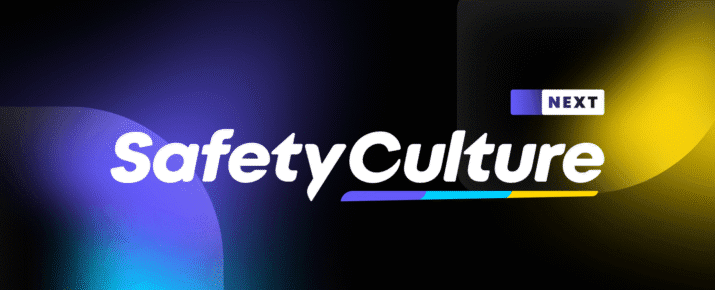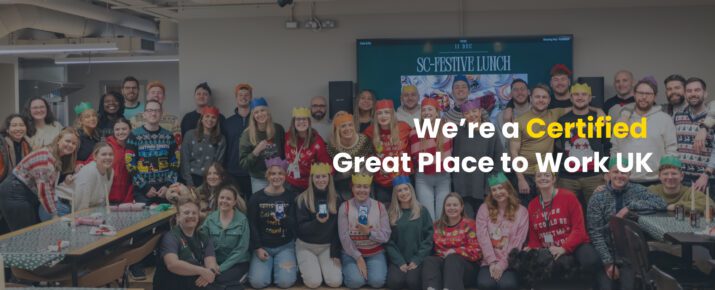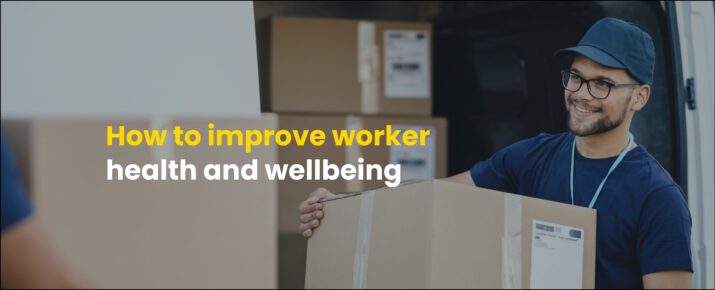“I had robbed myself of my mental peace,” VP of People shares mental health journey
Industry Trends | SafetyCulture News | By | 9 Oct 2020 | 6 minute read
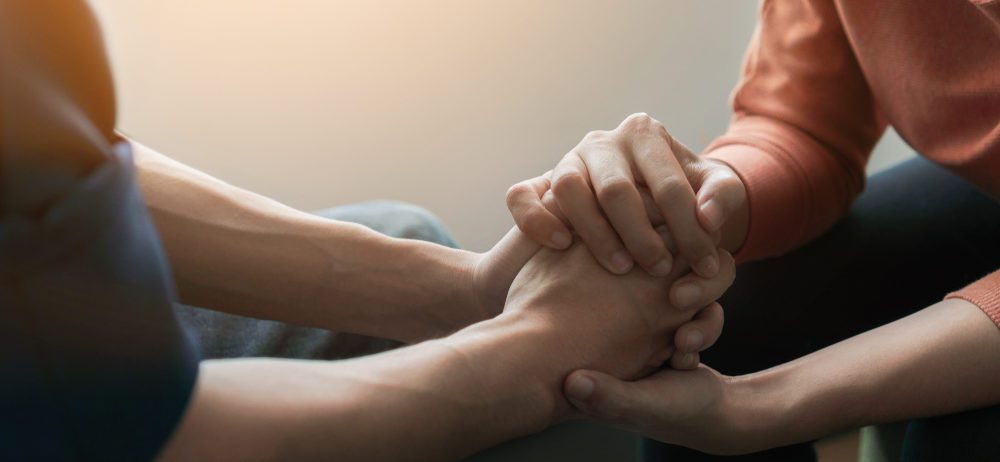
The past few months have been a challenging time for many, and people with mental health conditions are vulnerable to experiencing greater social isolation, grief, and economic uncertainty.
According to the World Health Organization, mental health is one of the most neglected areas of public health. Close to 1 billion people are living with a mental disorder, 3 million people die every year from the harmful use of alcohol and one person dies every 40 seconds by suicide. And now, billions of people around the world have been affected by the COVID-19 pandemic, furthering the impact on people’s mental health.
At SafetyCulture, we’ve seen first-hand the toll this pandemic has taken on employee wellbeing.
In an open letter to employees, Anna Wenngren, SafetyCulture’s VP of People & Culture, shared her own story about mental health:
“There’s a lot of noise at the moment about the impact of the coronavirus on people’s mental health. We hear about it on the news and in the media regularly. Reports tell us that anxiety and depression are at epidemic levels and social isolation is only amplifying this.
Last month I had my own realisation that I hadn’t been properly paying attention to my own mental health. I pushed through fatigue thinking it was nothing more than a busy workload. After a week or so I noticed that even when I did sleep through the night, I awoke feeling tense. My body wasn’t relaxed. I was on edge. This feeling didn’t really go away during the day and after several days I came to the realisation that I was experiencing an overwhelming state of stress.
At first I was embarrassed. As an Executive Coach I have coached scores of people on how to manage their stress levels and achieve greater calm and happiness in their lives. How could I have allowed this to happen to myself? When the initial shock subsided, I immediately went into self-coach mode. Why was I feeling this way? And I realised it wasn’t actually about my workload. Here’s what I discovered:
I love socialising after work. These engagements have always helped me to transition from work to play. By the time I arrive home, work is a million miles away in my mind. COVID changed this.
I’m very active. I love yoga and I have a personal trainer, but when the gyms closed and I was left to my own devices I became less disciplined. Without the structure of the routine I found myself skipping opportunities to exercise in favour of getting ‘just a bit more work done’. That’s a slippery slope.
I love the people I work with and I enjoy the social element of being in the office. A frustrating meeting is often forgotten after a quick debrief with a colleague. A stressful week can be soothed with a glass of wine and a few laughs with colleagues on a Friday afternoon. I commenced with SafetyCulture the week before we closed the office. I’m not going to lie, it’s been challenging forming connections with people in a virtual world. It’s not impossible, but doesn’t feel the same.
So if I summarise my reflections, I can now see that all of these touch points were ways in which I was previously managing stress, without even realising it! These activities (socialising, exercise, relationship building) were all ways in which I ‘switched off’. They helped me transition throughout my day and enabled a sense of balance. I never appreciated this unconscious skill that I possessed…. until it went missing.
Once I discovered how I had robbed myself of my mental peace, I started implementing strategies for managing it better. It’s not hard to do, if you know what you need to.
I watched a psychologist do a presentation last week and he said that “everyone is struggling. It may not look like it, but we all are, in some way. This really spoke to me because I realised that even on my bad days, I always had a smile on my face so you would never have known what was actually going on. Human beings are the master pretenders.
Many of us have been ‘coping’. But coping is a strategy for the short term, rather than a permanently sustainable way of being. Stress in the mind and body is cumulative – high levels of cortisol and adrenaline have long-term debilitating effects on our cognitive and physical wellbeing. Essentially, we borrow physical and mental energy from our reserves to cope with the increased demands of the present – a coping mechanism psychologists sometimes call ‘surge capacity’. Source: Are you where you think you are? H3
Dr Lucy Hone told us that COVID would be a marathon not a sprint – and many people are now finding that their energy reserves are running empty. Disillusionment and exhaustion are setting in for many. It’s important to recognise this and to talk about this. Doing so enables us to discover better strategies for living.
Remember, during this pandemic, despite appearances, no one has got their sh*t together. We are all struggling. But here’s a crazy thing. When someone steps into their vulnerability, and shares their struggle, they make other people feel better because people realise they are not alone. This is my hope in sharing my own experience.
I encourage everyone to embrace your own vulnerability and share what’s going on for you with a colleague or a friend. Let’s collectively embrace the reality that it’s okay to not be okay. Be there to support one another. Or if you want to talk to someone confidentially, speak to our Employee Assistance Program experts.
Don’t wait because right now you are still ‘coping’. Coping isn’t living. I visit a dentist twice a year because I value my teeth. I visit a psychologist every year because I value my mind. They are both proactive strategies to ensure I am in optimal health. How are you looking after yours?
What SafetyCulture is doing
At SafetyCulture, we’re investing in our employee’s mental wellbeing. We’ve introduced programs and benefits to give employees assistance and we’re committed to creating a culture that supports vulnerability.
Here’s how we’re helping our employees:
- Creating a culture of support and vulnerability
- Investing in programs and resources
- Providing resources for employees and customers
Creating a culture of support and vulnerability
One of SafetyCulture’s core values, Open, Honest, Always, represents the importance of transparency and honest communication between employees.
We don’t shy away from conversations with our coworkers, friends, and families. In her open letter. Anna shared a call for all employees to:
- Embrace vulnerability and share what’s going on for you with a colleague or friend
- Embrace the reality that it’s okay not to be okay
- Be there to support one another
For many, this could be as simple as asking the question, “Are you okay?” In its simplicity, this question can be an essential tool for developing relationships with someone who is struggling with their mental wellbeing.
At SafetyCulture, we’ve dubbed the month of October, “Wellness Month.” Programs and events are running globally to give employees the opportunity to take care of themselves – physically and mentally.
In all offices, our VP of People & Culture, Anna Wenngren hosted open sessions to discuss how employees could be there for each other when someone says they’re not okay, followed by an open dialogue about mental health, employee experiences, and how we can best be there for each other during tough times.
Employees have enjoyed free access to ClassPass to get moving at home with virtual fitness classes.
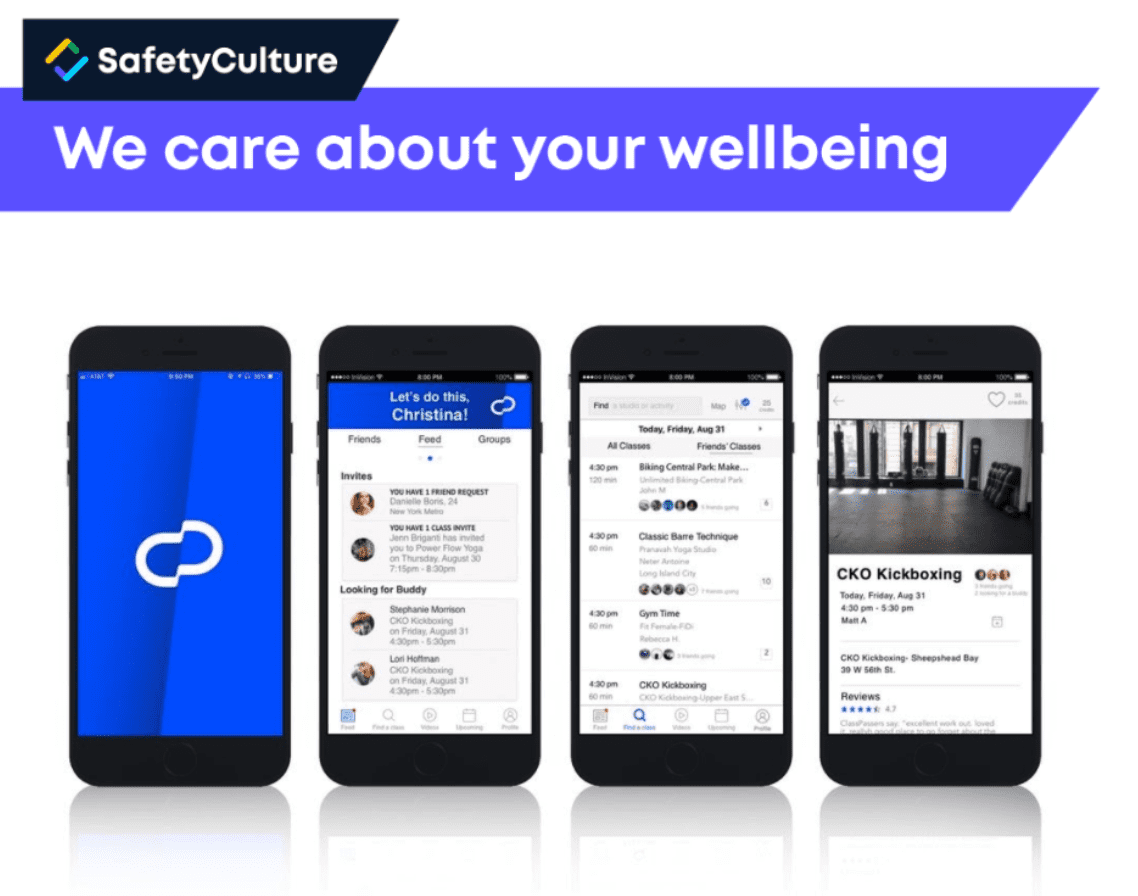
In the UK, employees received wellness care packages with information about events coming throughout the month.
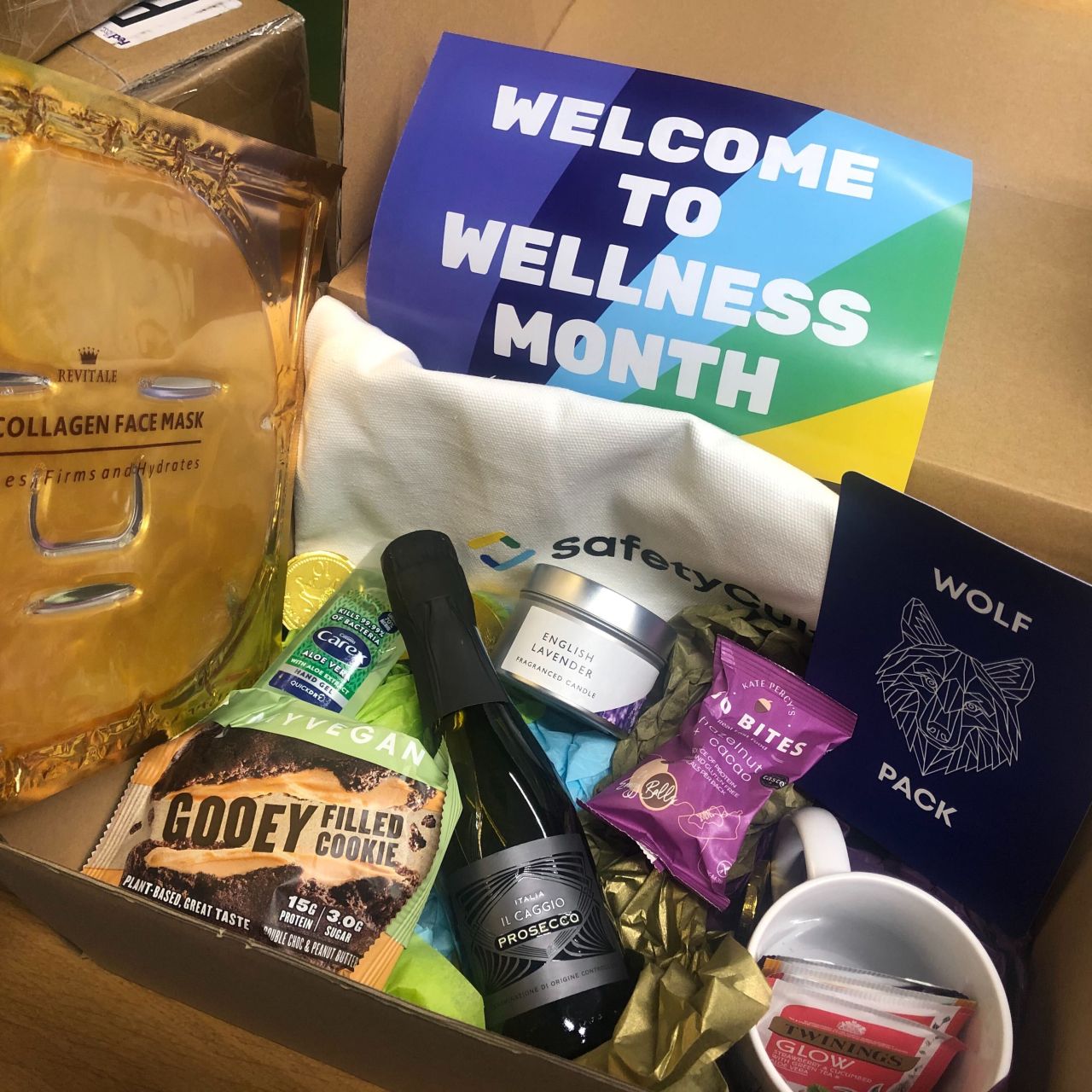
The Kansas City team kicked off a fitness challenge, breaking into accountability groups to accomplish wellness goals and connect with each other. They’ve lined up speakers over the course of the month to discuss the importance of taking care of yourself while working from home – an ergonomic setup, the importance of taking breaks, and stretching and posture tips.
In Sydney, in-office Chef Lucia is sharing healthy cooking tips and hosting virtual healthy cooking classes, and teams are organizing to get involved in charity wellbeing challenges, like One Foot Forward by the Black Dog Institute.
Investing in programs and resources
Vitally, SafetyCulture offers free resources and benefits to employees who may need some extra assistance. We understand life and work can be challenging at times. We want to ensure our employees have all the resources and services they need to prioritize their mental wellbeing to bring their best self to work.
Our employees and their immediate families have access to LifeWorks which is a free, personal, and confidential counseling service. The offering also includes access to a mobile app and wellbeing platform. Here’s an overview of what it offers and how it helps our employee:
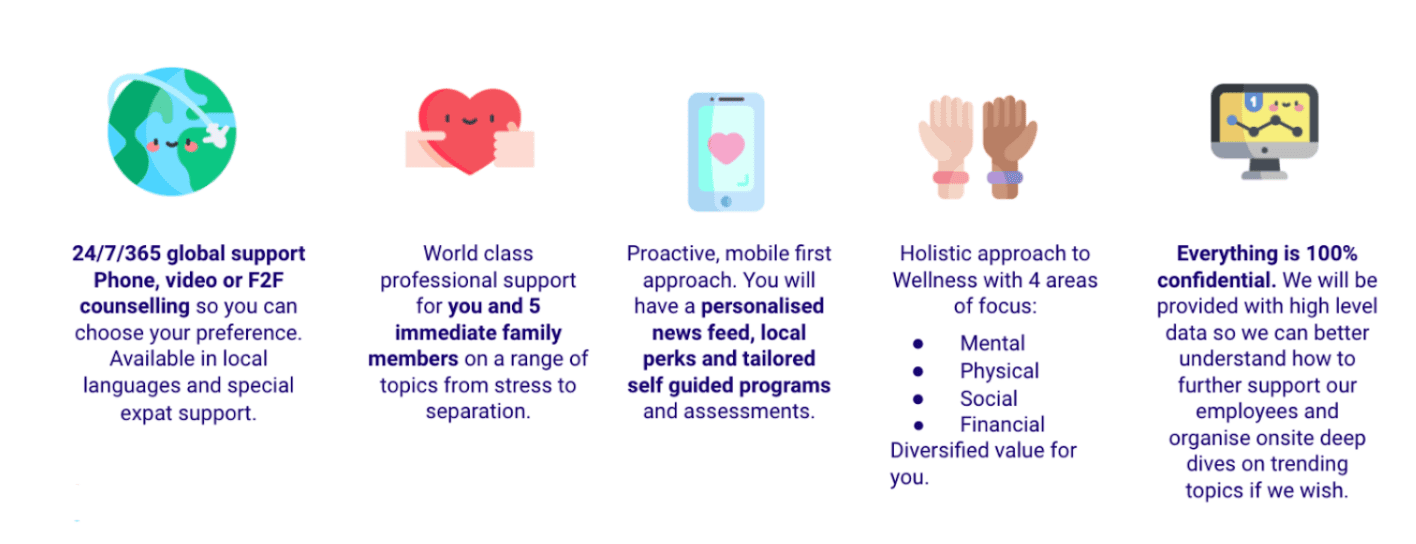
Mental health first aid training is also being rolled out for leaders in the Sydney office. SafetyCulture is dedicated to equipping our leaders with the essential skills and methods for supporting their teams through this crisis and beyond.
Providing resources for employees and customers
Technology is playing a greater role in mental illness information and prevention.
Incorporating regular mental health checks or screens could be an effective tool for keeping employee mental health at the forefront. Check out this weekly digital assessment to track your mental health and wellbeing from the Black Dog Institute: Mental Health and Wellbeing Assessment Checklist.
Digital meeting tools are making education more accessible. At SafetyCulture, our offices have held various virtual wellness workshops and classes, covering:
- Resiliency
- Stress Management
- Nutrition
- Financial wellness
Award-winning mobile training solution, EdApp, offers free training courses for employee wellbeing including a Suicide Prevention course in partnership with the United Kingdom National Health Service in an effective, micro-training format.
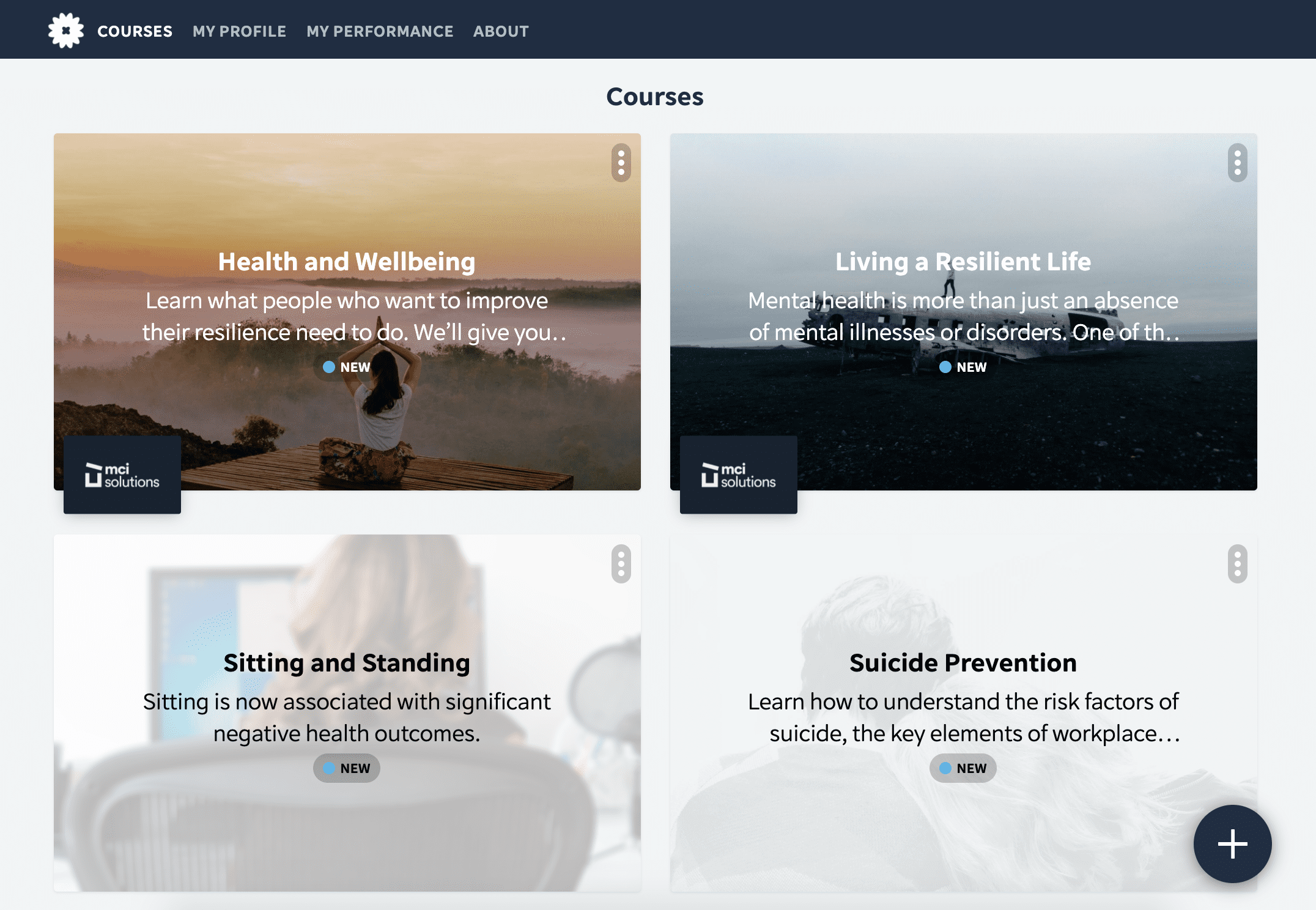
Now, more than ever, it is essential to invest in mental health. As individuals, take concrete actions in support of our own mental health. In relationships, support friends and family who may be struggling. As employers, take steps towards putting in place employee wellness programs.
Important Notice
The information contained in this article is general in nature and you should consider whether the information is appropriate to your specific needs. Legal and other matters referred to in this article are based on our interpretation of laws existing at the time and should not be relied on in place of professional advice. We are not responsible for the content of any site owned by a third party that may be linked to this article. SafetyCulture disclaims all liability (except for any liability which by law cannot be excluded) for any error, inaccuracy, or omission from the information contained in this article, any site linked to this article, and any loss or damage suffered by any person directly or indirectly through relying on this information.
